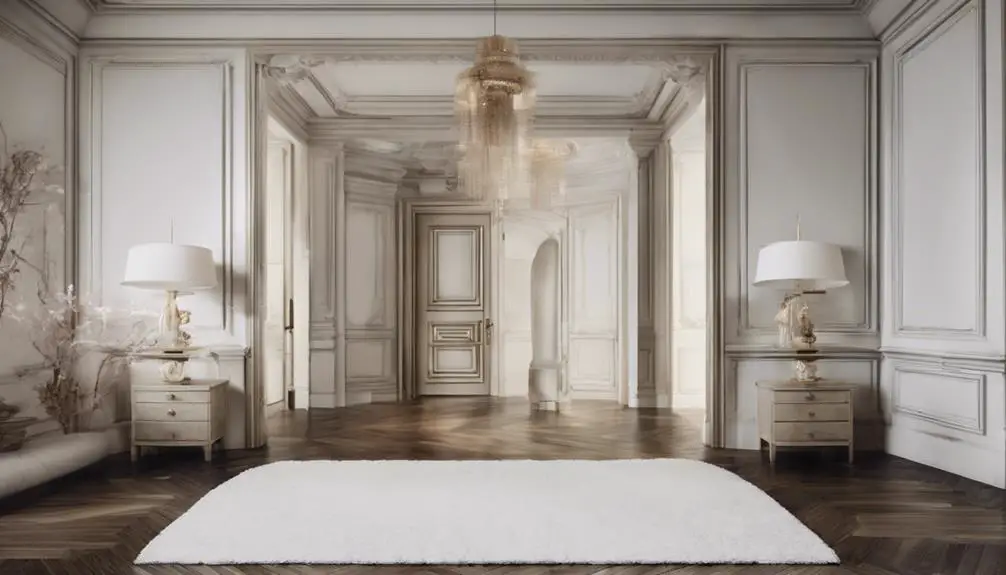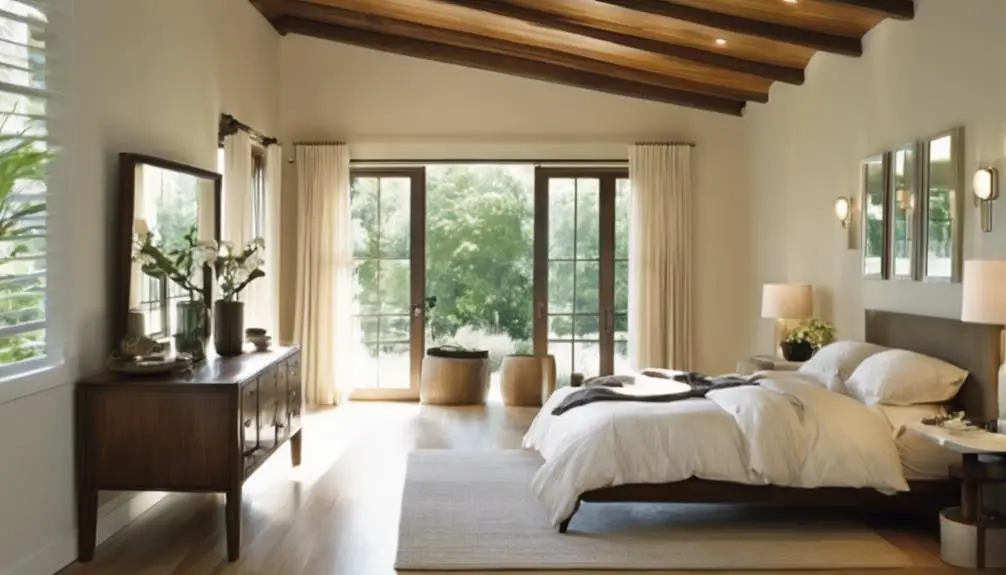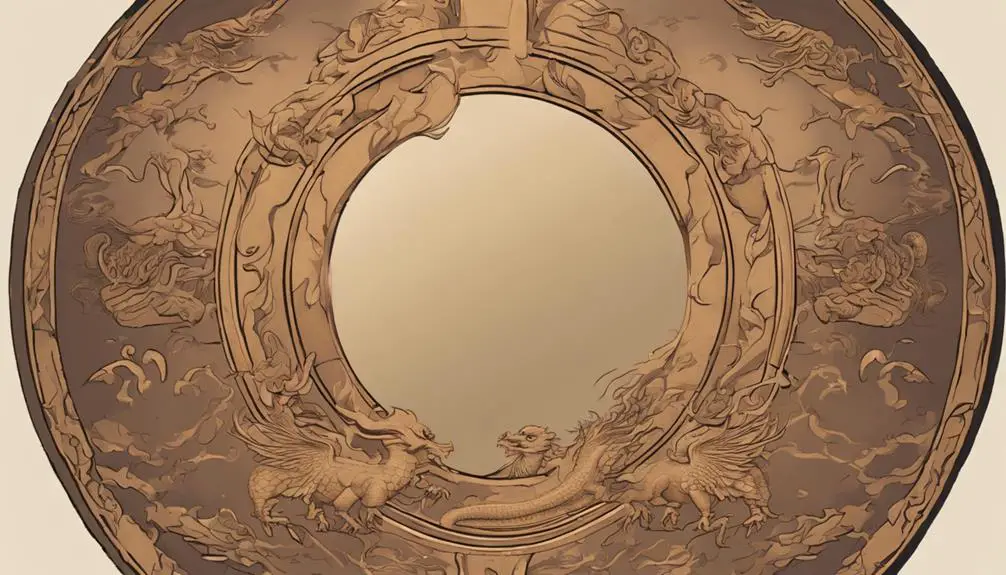Uncover the mystery of Feng Shui mirror placement in your bedroom and its profound effects on your life's energy.

Feng Shui Mirror Facing Bedroom Door
Did you know that around 30% of Feng Shui practitioners consider the placement of mirrors as one of the most important aspects, particularly when it comes to bedroom doors?
This might seem like a minor detail to you, but in the world of Feng Shui, it's believed to have significant implications on your life's energy, or 'chi.'
But what could possibly be the consequences of your mirror facing your bedroom door? And more importantly, how can you harness this practice to enhance positivity in your life?
We'll explore these intriguing questions in our discussion.
Key Takeaways
- Mirrors facing bedroom doors in Feng Shui can disrupt energy flow, potentially repelling positive chi.
- Reflecting the door may bounce off positive energy, affecting the balance in the room.
- Proper mirror placement, such as positioning it perpendicular to the bed, can promote positive energy.
- Misunderstandings exist about mirrors facing front doors; correct positioning is crucial for positive energy flow.
Understanding the Basics of Feng Shui

To fully grasp the concept of Feng Shui, it's essential to understand that it's an ancient Chinese art and science, steeped in more than 3,000 years of wisdom and tradition, centered on harmonizing the energy, or 'chi', within a space. The Feng Shui history is rich and complex, layered with philosophical concepts that were used to design and orient buildings and spaces in a way that was congruent with the flow of chi.
You see, the core principles of Feng Shui revolve around the balancing of yin and yang – the opposing forces that make up the universe. It's all about creating a harmonious environment where these energies are balanced. Other critical concepts include the five elements theory, which involves wood, fire, earth, metal, and water, and the bagua, a map used to determine how different areas of a space connect to various aspects of life.
In essence, Feng Shui isn't just about arranging furniture or decorating your home. It's a holistic approach to life, aiming to align your living or work space with the natural world, thereby fostering health, prosperity, and happiness. It's a cultural heritage that has shaped Chinese society, and it continues to influence many people's lives worldwide even today.
Importance of Mirrors in Feng Shui

In the realm of Feng Shui, mirrors aren't just decorative pieces; they're powerful tools that can significantly influence the flow of energy in your space. Known for their ability to broaden narrow spaces and illuminate dark corners, mirrors are often seen as portals of energy, reflecting and doubling the energy of what they see.
The mirror symbolism in Feng Shui is profound. They're used to attract, repel, or redirect the flow of chi (energy), making them a versatile element in your home's energy map. Reflective surfaces, like mirrors, have the ability to deflect negative energy and amplify positive energy, enhancing the overall balance and harmony in your space.
To give you a better understanding, here's a table detailing the symbolic importance of mirrors in Feng Shui:
| Mirror Positioning | Symbolic Meaning |
|---|---|
| Mirror facing the entrance | Attracts positive energy |
| Mirror reflecting the dining area | Amplifies abundance and wealth |
| Mirror reflecting greenery | Enhances health and vitality |
| Mirror reflecting water | Promotes tranquility and calmness |
Mirror Facing Bedroom Door: Implications

When you position a mirror facing the bedroom door, you're stepping into a complex area of Feng Shui with numerous implications for your home's energy dynamics. In the world of Feng Shui, mirrors are powerful tools; their ability to reflect and multiply can drastically alter the energy flow within your home.
Door reflections, for instance, are believed to bounce off the positive energy entering your bedroom, sending it back out. This is thought to disrupt the balance of Qi, the life force in Feng Shui, potentially leading to restlessness in sleep, increased stress, and a general sense of discomfort.
Additionally, if your mirror is positioned so that it reflects your bed, it might create a doubling effect, which in Feng Shui can symbolize inviting a third person into the relationship, potentially leading to infidelity.
However, not all implications are negative. If your bedroom door faces a pleasing view, the mirror could amplify this positive energy, enhancing the overall vibe of your space.
Understanding these implications can help you make informed decisions about where to place mirrors in your home. But remember, Feng Shui is a complex art and science, and what works for one home may not work for another.
How to Correctly Position Your Mirror

Given these potential consequences of a poorly placed mirror, it's essential you're thoughtful about its positioning in your bedroom to maintain balance and harmony according to Feng Shui principles. Mirror aesthetics aren't just about looking good, but also about the energy and vibration they project into your space.
Position your mirror so it doesn't reflect the bed directly. This is a fundamental Feng Shui rule, as it's believed to bring restlessness and amplify worries. Instead, place your mirror on a wall perpendicular to your bed. Ensure it reflects something pleasant, such as a beautiful view or artwork, promoting positive energy.
Reflective surfaces play a crucial role in Feng Shui. They're not only used for decoration but also for redirecting energy. However, be careful that mirrors aren't reflecting clutter or sharp corners, as this can lead to negative energy.
Here's a quick guide to help you:
| Feng Shui Mirror Placement | Do's and Don'ts |
|---|---|
| Position | Perpendicular to bed, not directly opposite |
| Reflecting | Pleasant views or artwork, not clutter or sharp corners |
| Aesthetics | Balanced and harmonious, not causing restlessness |
Common Myths About Feng Shui Mirrors

Let's debunk some of the prevalent myths surrounding Feng Shui mirrors that often lead to misconceptions and improper application in home decor. You've likely encountered some oversimplified advice and mirror superstitions, but don't let these deter you from understanding the true cultural interpretations of Feng Shui.
One common myth is that all mirrors bring good luck. In reality, the positioning and type of mirror matter significantly. For instance, concave or convex mirrors should only be used outside to deflect negative energy, not inside your home.
Another myth is that mirrors should always face the bed. This isn't always beneficial. In fact, if you're not sleeping well, a mirror facing your bed could be the culprit. It's believed to bounce energy around the room, disrupting your rest.
Lastly, some believe that a mirror facing the front door will push away all incoming good luck. This is a misinterpretation. A mirror facing the front door can actually expand the space and attract positive energy if positioned correctly.
Achieving Balance With Feng Shui Techniques

Mastering the art of Feng Shui involves creating a balance of energy within your living space, and understanding the proper placement of mirrors is a key aspect of this practice. This ancient Chinese philosophy is all about achieving 'Harmony Through Arrangement', aligning your environment to attract positive energy or 'chi'.
Integrating Natural Elements into your space is another crucial part of Feng Shui. The five elements—wood, fire, earth, metal, and water—should be represented to create a balanced, harmonious environment. For instance, a wooden furniture piece or a plant can represent wood, while a mirror or a water feature can symbolize water.
Here's a simple guide to help you implement these principles:
| Element | Feng Shui Representation | Ideal Placement |
|---|---|---|
| Wood | Plants, Wooden Furniture | East, Southeast |
| Fire | Candles, Fireplace | South |
| Earth | Clay pots, Stones | Centre, Northeast, Southwest |
| Metal | Metal Decor, White Items | West, Northwest |
| Water | Mirrors, Water Features | North |
Frequently Asked Questions
What Are the Potential Negative Effects of Not Following Feng Shui Principles?
If you're not adhering to Feng Shui principles, you could experience Feng Shui consequences like energy disruption. This can lead to an unbalanced home environment, possibly affecting your mood and health.
It's believed that your energy, or 'Chi', can get disrupted leading to stress, lack of sleep, and even relationship issues.
Are There Any Specific Types or Shapes of Mirrors That Are More Beneficial in Feng Shui?
You're asking about mirror types and shapes in Feng Shui. Traditional Chinese mirrors, known as Bagua mirrors, are considered the most beneficial. They're octagonal, framed with eight trigrams of the I Ching.
Mirror placement and material are also key. A well-placed mirror can enhance positive energy, while the material can reflect or absorb energy. So, consider these factors when choosing your mirror for optimal Feng Shui benefits.
It's a fascinating cultural practice, isn't it?
Besides Mirrors, What Other Household Items Should I Be Aware of in Terms of Feng Shui?
Besides mirrors, you should also consider Feng Shui plants and the impact of color in your home. Plants like bamboo or peace lilies can attract positive energy. Similarly, color impacts Feng Shui greatly. Red can bring luck and wealth, while blue can induce relaxation.
How Does Feng Shui Relate to Other Philosophical or Spiritual Practices?
Feng Shui's origins tie into broader Eastern philosophies, such as Taoism and Buddhism. You'll find shared concepts like balance, harmony, and energy flow across these practices.
It's interesting though, each philosophy applies these principles differently. In Feng Shui, they're used to optimize spatial arrangements. But remember, it's not solely about physical objects like mirrors. It's a holistic approach to achieving harmony in all aspects of life.
Can Feng Shui Principles Be Applied to Spaces Outside of the Home, Such as a Workplace or Public Space?
Absolutely, you can apply Feng Shui principles to your workplace or any public space. It's about creating harmony and positive energy flow wherever you are.
You'll notice an improvement in workplace harmony and the energy of public spaces. It's not just about home decor; it's a holistic approach to life that can truly enhance your overall wellbeing.
Conclusion
So, you've learned the ropes of Feng Shui mirrors.
It's clear that mirrors carry weight in this ancient practice, and their placement matters, especially when facing your bedroom door.
Don't fret over the myths, but strive for balance in your space.
Remember, fixing the position of your mirror isn't daunting, it's a simple way to harmonize your surroundings.
You're now equipped to create a serene and positive environment with your newfound Feng Shui knowledge.


Sign up